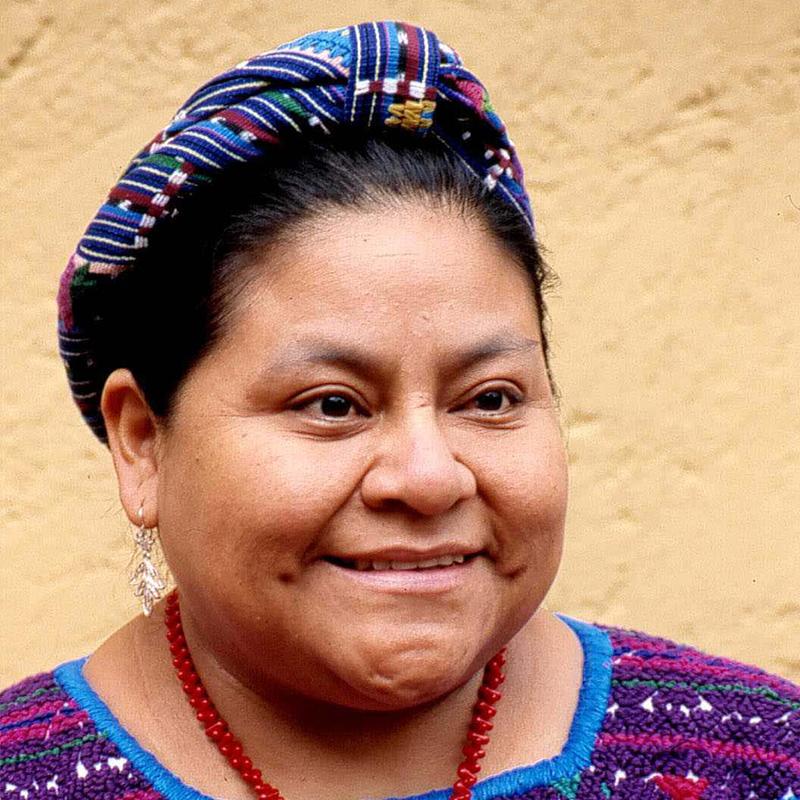
Rigoberta was born in Laj Chimel, Guatemala on January 9, 1959 into a poor Indigenous family of K’iche’ Maya descent who earned their living by picking coffee beans on big plantations. In 1960, when Rigoberta was just a year old, civil war broke out as economic and ethnic tensions erupted across the country. As Rigoberta grew up she witnessed extreme violence towards her family as they were directly involved in speaking out against racism towards Guatemala’s Indegenous people. As a teenager, Rigoberta followed in her family’s footsteps becoming involved in various social reform activities through the Catholic Church, and gained prominence for her participation in the women’s rights movement in Guatemala. Her participation in these activities placed her, as well as her family, in dangerous waters, especially with the guerilla organization established in their hometown. Local gangs acted on unsupported speculation that Rigoberta’s family were participants in the execution of a local planation ower which resulted in the imprisonment and torture of her father.
In 1979, Rigoberta joined her father as a member of the Committee of the Peasant Union (CUC), an Indigenous Guatemalan labor organization which aimed to protect native land, access to water and food, as well as with other basic human rights. However, the family’s involvement with the Union only increased the violence towards Rigoberta’s family. Her mother and brother were arrested, tortured, and killed by the army. A year later, in an event commonly known as the Burning of the Spanish Embassy, security officials stormed the location where Rigoberta and other members of the Committee for Peasant Unity were holding a peaceful protest. During the raid, the building caught fire leaving 36 people dead, including Rigoberta’s father.
Instead of letting the unjust losses of her family members deter her, Rigoberta became increasingly active in the CUC, and taught herself Spanish as well as other Mayan languages beyond her native Quiche so she could better communicate with those around her and fight for all Indigenous rights. In 1980, she figured prominently in a strike the CUC organized for better conditions for farm workers on the Pacific coast, and on May 1st, 1981, she was active in large demonstrations in the Guatemalan capital. She joined the radical 31st of January Popular Front, in which her contribution chiefly consisted of educating the Indegenous peasant population in resistance to massive military oppression.
By 21 years old, Rigoberta’s actions had resulted in her exile. She fled to Mexico where she continued to advocate for her people by organising resistance against oppression and standing up for her people’s rights. As part of her plight, she co-founded the United Republic of Guatemalan Opposition. While in exile, Rigoberta shared her story with Elisabeth Burgos-Debray, a Venezuelan author and anthropologist. The widely translated book, Me llamo Rigoberta Menchú y así me nació la conciencia (My Name is Rigoberta Menchú, and this is how my Conscience was Born), garnered Rigoberta a significant amount of attention, making her an international icon amidst the Guatemalan civil war. She also lent her voice to When the Mountains Tremble – a film telling the story of the Mayan people and their suffering.
In 1992, Rigoberta was awarded her highest accolade – the Nobel Peace Prize – “in recognition of her work for social justice and ethno-cultural reconciliation based on respect for the rights of indigenous peoples.” She used her prize money to found the Rigoberta Menchú Tum Foundation which supports Mayan communities. The group was designed to help the survivors of the civil war and genocide to seek justice for the crimes commited against them. In 2015, after years of campaigning, the Rigoberta Menchú Tum Foundation’s fight for justice paid off when former Prime Minister of Guatemala, Efraín Ríos Montt, was charged with murder, attempted murder, and crimes against humanity for his role in the Spanish embassy attack.
The Guatemalan civil war ended in 1996 after 36 years of conflict. Rigoberta was eventually able to return to her home country, where she served as UNESCO Goodwill Ambassador for the Peace Accords and formed the Indigenous political party Encuentro por Guatemala (Encounter for Guatemala). She also became involved with WINAQ – a party whose roots are also in the Indigenous communities. After becoming actively involved in politics, Rigoberta decided to run for presidential election in both 2007 and 2011. Unfortunately, she was unsuccessful on both occasions but she continued to show her commitment to improving the futures of the less fortunate and those that had been impacted by the civil war.
In 2006 Rigoberta co-founded the Nobel Women’s Initiative with 6 fellow female Prize winners: Jody Williams, Shirin Ebadi, Wangari Maathai, Betty Williams, and Mairead Corrigan Maguire. The group was created to campaign for justice, peace and equality for women across the world. In February 2016, the work of the Nobel Women’s Initiatve paid off as the Supreme Court of Guatemala charged ex-Army Officer Francisco Reyes Giron and paramilitary fighter Heriberto Valdez Asij with crimes against humanity, including sexual violence, forced disappearances, and murder.
Today, Rigoberta continues to be involved in humanitarian work, acting as President for two companies who aim to provide low cost medicine to those from low economic backgrounds. She is also an active member of PeaceJam – an organization that aims “to create young leaders committed to positive change in themselves, their communities and the world through the inspiration of Nobel Peace Laureates who pass on the spirit, skills, and wisdom they embody.” I find Rigoberta’s sense of perseverance and fight for change simply astounding, especially in these difficult times of social unrest. Rigoberta is truly an icon of hope and I think much can be learned from her story.
-Brittany Hill
Sites of Girlhood Manager
Girl Museum Inc.
